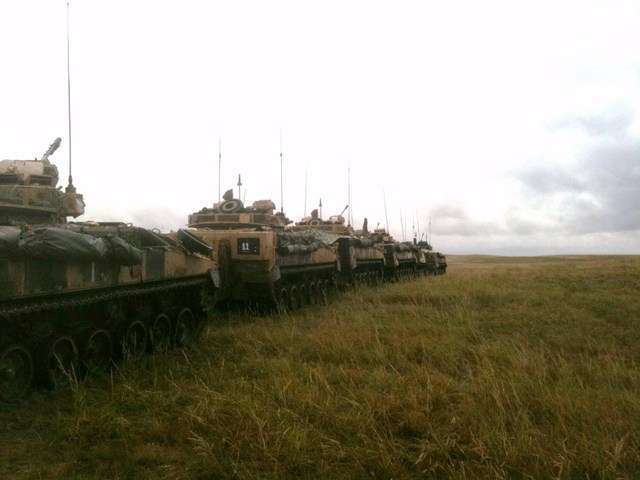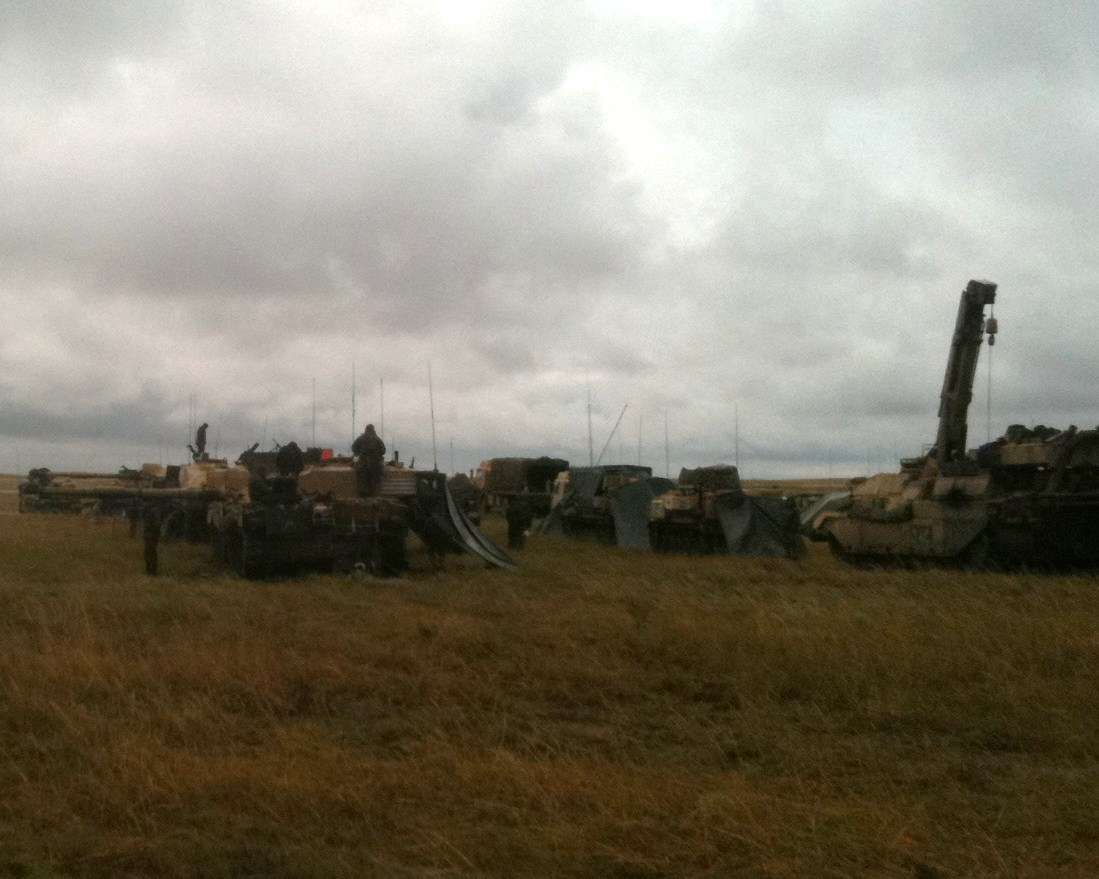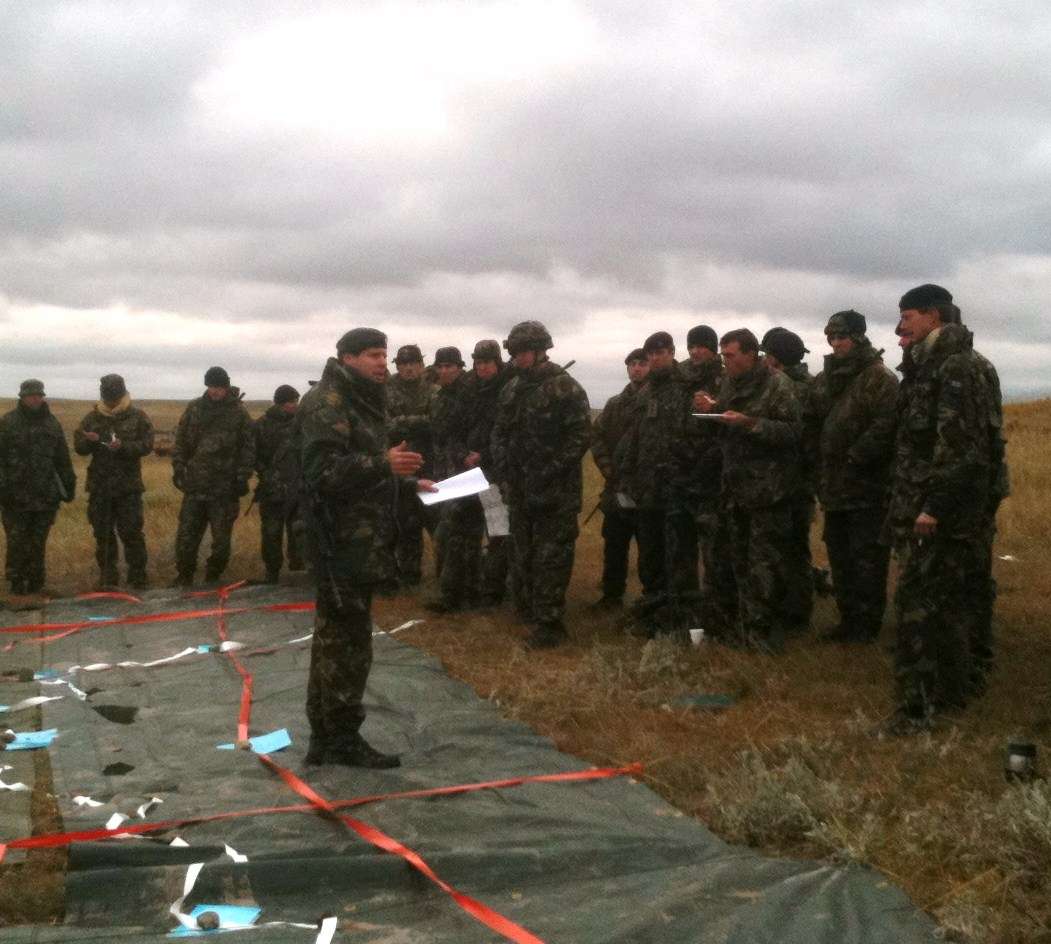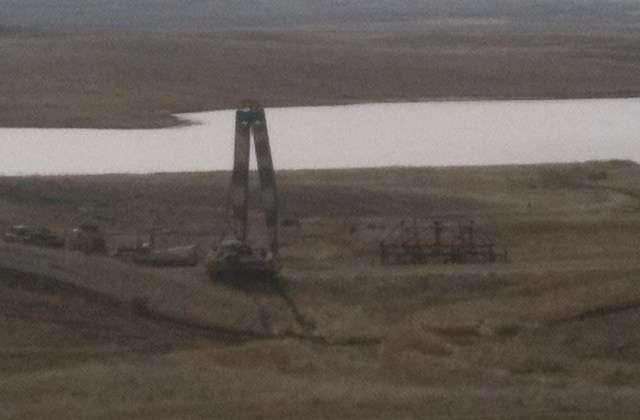Two months into my posting at CFB Suffield, I'm convinced that I have the coolest job in the Canadian Forces Chaplaincy. One of the reasons for that conviction is that last month I had the opportunity to visit the training area as the guest of Padre Stewart Young, the British Battlegroup (BG) Chaplain for EX PRAIRIE THUNDER 5.
As I write this on a sunny October morning, fall has come gloriously to Alberta, but this September just past was horrible, rainy, overcast, and cold. In mid September I caught a ride out to the BG's location with two British soldiers from BATUS (British Army Training Unit Suffield), one of whom, a signaller Warrant Officer, rejoiced in the title of Yeoman of Signals. Our truck struggled along the slimy mud roads, up and down hills, at one point watching a heavy lorry (truck) fishtailing alarmingly ahead of us. "He's got those naff sand tires on" said the driver. Asking what a naff tire was, it was kindly explained to me that "naff" was slang for rubbish, no good, useless. It can also be used to describe someone you don't like or who is rather pathetic.
The drive took about an hour. The training area is that big and the roads were that bad. Under the grey sky and rain the prairie looked especially dispiriting, an endless expanse of rolling, grassy hills as far as the eye could see. During the hour trip I saw exactly one tree. The BATUS staff speak of "prairie sickness", a reaction to the monotony and isolation of this vast area.
I was delivered in the position, or "leaguer", of the BG, which comprised roughly a thousand troops drawn from the British Army's 20th Brigade, an armoured force whose home station is Paderborn, Germany. Warrior armoured personnel carriers, mighty Challenger tanks, agile looking Scorpion recce tanks, recovery vehicles, trucks, and Land Rovers were laid out in long rows. Today was a Maintenance Day, a chance for troops to service their vehicles, resupply, and perhaps catch some rest before the next day's exercise. Tent flies were attached to the sides of vehicles, sheltering sleeping forms next to another vehicles were troops hammered track back into place or shaved in the side mirrors.
I managed to take some rather naff photos with my iphone before the battery failed me.
 Warrior APCs on the barren prairie. These vehicles are roughly equivalent to Canada's LAVs.
Warrior APCs on the barren prairie. These vehicles are roughly equivalent to Canada's LAVs. Maintenance on some Challenger tanks (left). On the right is a massive Challenger recovery vehicle. In the center troops rest under flies attached to their Warriors.
Maintenance on some Challenger tanks (left). On the right is a massive Challenger recovery vehicle. In the center troops rest under flies attached to their Warriors.When I arrived Padre Young was busy assisting a soldier with an issue back home, so I stowed my gear with his driver, a likable Yorkshireman with a thick and at times incomprehensible accent. As his mates wandered by they kept saying "Hiya John Boy" and on asking why he was called John Boy, he told me his last name was Walton. Of course.
I then wandered among the lines, a happy military tourist, and when troops had time to notice me, they were unfailingly polite. A short, sturdy and bearded tank sergeant, who looked remarkably like one of one of Tolkien's dwarves, connected me with one of his men, a Cpl Perkins, who allowed me to sit in the turret of his massive Challenger tank. Cpl Perkins kindly explained the layout and function of the various crew stations, a marvel of engineering and compactness, until his duties called him away.
 A proud heritage. A Challenger tank commander under the pennant of his regiment, the Queen's Own Hussars.
A proud heritage. A Challenger tank commander under the pennant of his regiment, the Queen's Own Hussars. Another armoured heritage, the naming of vehicles.
Another armoured heritage, the naming of vehicles.Standing in the mess line with John Boy, I was struck by the remarkable ethnic diversity of the British army. Fijians and Africans from Ghana and Kenya mixed with lads from all over the UK. Until quite recently the Army has recruited FOC (Foreign of Commonwealth) troops from across the former British Empire, but I gather has ceased this practice since the Army is now considered fully manned. By and large they seemed to get along with one another.
My host, Padre Young, showed up towards dinner, or "scoff" as they call it. Stewart is a British Army chaplain, which means that unlike my Branch, which is triservice (my next posting could be to a ship), Stewart and his colleagues only serve with army units. He is currently padre to 5 RIFLES, an infantry regiment of ancient lineage (their cap badge would be familiar to fans of the TV series Sharpe's Rifles) based in Paderborn. Stewart is the embodiment of the army chaplain, an energetic, cheerful man, unafraid of the discomforts of the field (he served briefly as a Royal Marine in his youth), with a huge heart for his troops and for God. Despite our denominational differences (he's a Methodist, I'm Anglican) I felt in the company of a kindred spirit.
Just before sunset, the BG turned to the coming day. The BATUS staff had called for the BG to attempt an unopposed river crossing, meaning that the various components would have to move towards a large terrain obstacle, do their nightime reconnaisance, organize a scheme of maneuvre for all the various BG components, make a difficult crossing on muddy and narrow roads, and be prepared for action afterwards. Despite the absence of the enemy, it was a complex process for units that were not always accustomed to workingn with one another. Stewart led me over to a model of the terrain, laid out with tarps, rocks and bits of mine tape by a likable sergeant major whose foxy face made me think of a poacher from a Thomas Hardy novel. The BG commander, a charismatic and expressive Lt Col with a double barrelled name and the quality of someone from a long line of soldiers, led a long and to my mind surprisingly informal briefing in the last moments of daylight. His officers were an interesting bunch. Scruffy, long haired (compared to the shaved or short high and tight styles favoured by Americans and some Canadians), dressed in a variety of military and some civilian kit, they were nevertheless professional and intelligent.
 BG CO briefs his officers before the river crossing to come in the morning.
BG CO briefs his officers before the river crossing to come in the morning.The night to come was busy, and I doubt that the BG got much sleep. I managed four hours in a small tent kindly lent to me by Stewart, and woke shivering in the dark at reveille, 04:00hrs. the British followed their "Morning Routine", which consisted of stowing kit, checking that vehicles were functioning, and then having "a brew" (tea) and a shave if time permitted. A gorgeous sunrise promised a warmer day.
 Sunrise on the prairie, illuminating a row of transport and supply vehicles.
Sunrise on the prairie, illuminating a row of transport and supply vehicles.Watching the obstacle crossing would be a problem, because Stewart's Land Rover could only seat two and it would be restricted to the logistical tail of vehicles that would be kept in the rear echelon. Stewart solved that problem by finding us seats in two of the BATUS vehicles that would be observing and critiquing the day's exercise. I spend the morning with a young captain, Will Locke, who had seconded to BATUS from his unit, the 9/12th Lancers, an armoured recce unit driving fast tanks and with all of the dash and elan of their heritage, as can be seen in
this video they made. Will had a tour in Iraq under his belt, and knew his trade. He would be observing the reconnaisance work of the BG and indeed had been out most of the night watching the recce elements surveying the river for the required crossing points. When his duties permitted, he was a charming and informative host. He endeared himself to me by smoking a pipe, something rare in young men and something I used to do.
 Seen from Will's truck, elements of the BG move towards the river crossing,
Seen from Will's truck, elements of the BG move towards the river crossing,Riding in Will's truck, I was able to hear the BG communicating amongst itself on one radio net, while on another I could hear the BATUS staff observing and talking amongst themselves, noting both good and bad points for the debrief afterwards. It was a fascinating experience, rather like listening to the play by play of a sporting event while listening at the same time to the athletes themselves. It all underscored the point that training is meant to save lives by giving troops the chance to test themselves and work out the bugs before they go into combat, which the BG will be doing sometime in the future.
 Heavy metal. Once the river was crossed and secure, the BG could bring up its bridgelaying equipment to make a more permanent crossing. This gear, seen about 1 k away, was huge.
Heavy metal. Once the river was crossed and secure, the BG could bring up its bridgelaying equipment to make a more permanent crossing. This gear, seen about 1 k away, was huge.A comical moment: I was outside Will's truck, attending to nature's call, when over the crest of the hill behind me came the vehicle of CO BATUS, a full colonel who was overseeing the exercise as well as the work of his control staff. I hastily zipped up and beat a retreat to the truck, but Will was called over and told by CO BATUS that he didn't want to see visitors in temperate clothing (my green Canadian combats) mixed in with his control staff, who all wear arid (desert pattern) uniforms to distinguish themselves as non-players from the exercising troops. I have yet to have any face time with Col Carver, CO BATUS, and if I do, I wonder if this incident will come out. Technically I am Padre to his organization as well as to the CF staff at Suffield, and hopefully he will at least be pleased that his padre is out on the prairie with his people.
The day's exercise went well. The BATUS staff were impressed overall with the BG's performance and with their planning. For the next two weeks the BG practiced increasingly more difficuly drills and challenges, encountering real opposition from the BATUS troops brought in as the opposing force (OPFOR). These combats are a lot like lasertag on an epic scale, with troops and vehicles wearing electronic vests that determine who is killed or wounded. The EX also includes live fire exercises, though not at other troops of course. The night live fire ranges are apparently quite epic, and I hope to see them in due course. With all the exploding things out their on the ranges, the CF range control and fire suppression teams can be quite busy.
After a few days debauchery in Medicine Hat and Calgary, the BG is on its way home now, and another group will come in from Germany next week to spend its time on the ranges before winter sets in. Kay and I had Padre Young over for a more genteel debauch, complete with home cooking, some Alberta ale (
Warthog from Big Rock) and some single malt scotch (Bruichladdich) in honour of Stewart's Scots heritage. He's on his way home tomorrow.
I wish I had a photo of Stewart to share, but I did go online and find this
grace which he wrote in Afghanistan when he was the chaplain of the Queen's Dragoon Guards, a reminder that a sense of humour and a way with words are often useful to a padre.
Grace for the QDG 50th
Anniversary Dinner
by Padre Stewart Young
(With apologies to all serious poets!)
We gather here in celebration
of 50 years since amalgamation.
The Queen’s Bays and King’s Dragoon
Guards were joined as one,
1st The Queen’s Dragoon Guards to become.
And looking back, since fifty-nine,
with pride in our hearts, we trace our line,
from Wolfenbuttel to Musaymir;
from Sennelager to Garmsir.
First and foremost, we’ve always been,
proud Dragoons who serve our Queen.
And on this day, in this foreign land,
where we’ve been before, we take our stand,
to serve once more, under the eagle,
our badge of honour, which has no equal.
And one more time, we take our pause,
to bring our thanks before our God,
for all he’s done o’er 50 years
to bless our efforts and quell our fears
as we’ve faced great odds and many a
challenge;
as we’ve fought with stealth and used our
skill, to find and fix,
any who’ve dared to pit their wits
against The First, The QDG
the one, the only, Welsh Cavalry.

















